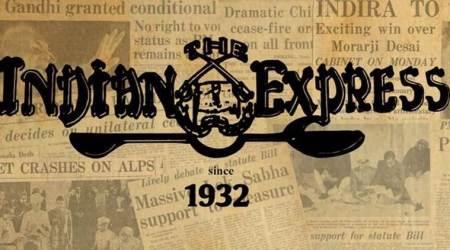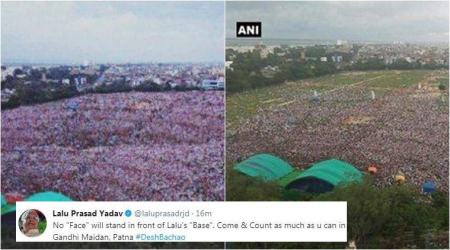 Patna: Rashtriya Janata Dal (RJD) chief Lalu Prasad with his daughter Missa Bharti and sons Tej Pratap and Tejashwi Yadav during “BJP Bhagao, Desh Bachao” rally in Gandhi Maidan in Patna on Sunday. PTI Photo
Patna: Rashtriya Janata Dal (RJD) chief Lalu Prasad with his daughter Missa Bharti and sons Tej Pratap and Tejashwi Yadav during “BJP Bhagao, Desh Bachao” rally in Gandhi Maidan in Patna on Sunday. PTI Photo
On August 27, the RJD organised an impressive rally in Patna, titled “BJP Bhagao and Desh Bachao”. But essentially, the purpose of the rally was to explain the party’s position on the disproportionate assets cases slapped by the CBI on Lalu Prasad’s family, which resulted in the break-up of the Mahagathbandhan in Bihar. Lalu Prasad resorted to parochialism by referring to Raghopur, Chhapra and other places of Yadav domination and thanked individuals notorious for their shady business dealings. His references to the problems of sand mining must have gladdened the hearts of the sand mafia. Pandering to such populism has dangerous consequences. Even a pretence of probity-centric politics seems to have no place today in Bihar.
During the freedom movement, Mahatma Gandhi set a high standard of probity because of his personal sacrifices, his refusal to take up any office of profit or promote the interest of his relatives. Even though Jawaharlal Nehru and Subhas Chandra Bose disagreed ideologically with Gandhi on many counts, they could not propose an alternative political strand, because of the moral hegemony exercised by the Father of the Nation.
After Independence, the idea of political probity retained hegemony. Without it, Nehru and Sardar Vallabhbhai Patel could not have choreographed the foundation of Indian pluralism in the aftermath of Partition. Such leaders were not limited to the Congress party. Communists like Hiren Mukherjee, Bhupesh Gupta, E.M.S. Namboodiripad and P.C. Joshi, and socialists like Ram Manohar Lohia, N.C. Goray, Madhu Limaye and Karpoori Thakur were unmatched when it came to probity. The Jan Sangh was in its infancy at that time. Even then, its leaders, Syama Prasad Mookerjee, Atal Bihari Vajpayee, Balraj Madhok and M.L. Sondhi made their mark in parliamentary politics thanks to their personal integrity.
Ensuring probity and moral hegemony during the freedom movement is one thing, but doing so when the political process started revolving around the capture of power post-Independence is a different proposition. But one has to appreciate that Nehru created the benchmark of moral hegemony in governance. His son-in-law Feroze Gandhi’s intervention in parliament on the Mundhra scandal led to the resignation of T. T. Krishnamachari, the then finance minister. Even on the question of his succession, Nehru did not adopt a brazen strategy. He did groom Indira Gandhi into public life; but did not ensure her ascendancy in his lifetime.
During the mid-1970s, corruption and criminalisation started overtaking the public space. Indira Gandhi completely reinvented herself after the mid-1970s. The last straw was the resignation of P.N. Haksar, her principal secretary and “moral and ideological compass”, in Jairam Ramesh’s words. Indira Gandhi promoted her son and his “Maruti venture” in a brazen manner.
Parallel to such moral degradation was the political stream that preached the “end of ideology” and “party-less democracy”. The initiative was led by Jayaprakash Narayan and supported by “Congress for Cultural Freedom”, a US-based organisation. In the process, most of the people-centric socialist parties got liquidated. This put an end to ideology-driven political cadre building. Criminals and moneybags infiltrated politics. This phenomenon was pan-Indian but Bihar and Uttar Pradesh were its worst victims. By the 1990s, positive discrimination was the only agenda of most of the ideology-driven socialist parties. This helped them get an immediate social constituency which, in turn, provided them electoral dividends. In the process, ideology-driven leaders were marginalised and brash subaltern leaders, without any ideological moorings, began to exercise their sway. This was quite different from the Dravidian movement which was led by organic intellectuals who ensured the social progress of the subalterns preceded their quest for political power.
We are now in a phase where corruption has attained hegemonic proportions. For the return of ideological hegemony, irrespective of its hue, probity in politics has to be given primacy and dynastic politics should be rooted out.

